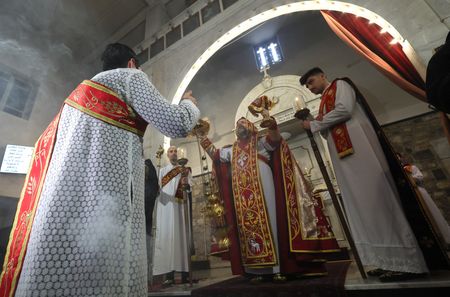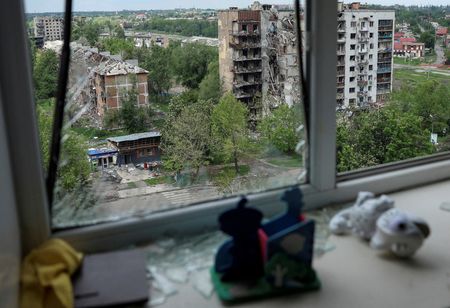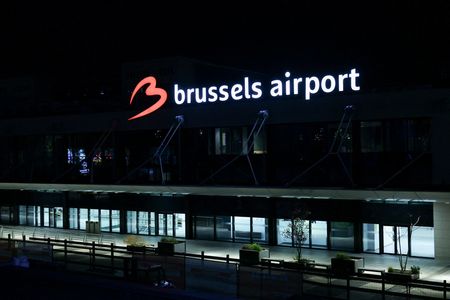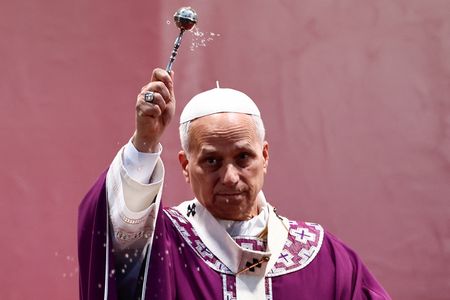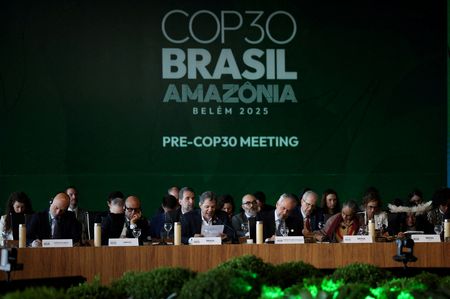By Amina Ismail and Firas Makdesi
DAMASCUS (Reuters) – Syrian church leaders are advising Christians to scale back Christmas celebrations this year, despite assurances from the Islamists who have just taken power that they are free to practise their religion.
The self-imposed constraints highlight one of the main challenges for Syria’s new Islamist rulers: establishing mutual trust among a myriad of minorities, all scarred by decades of brutal dictatorship and 13 years of pitiless civil war.
De facto ruler Ahmed al-Sharaa has told Christians and other groups that they will be safe in a Syria run by his Hayat Tahrir al-Sham (HTS), a former al Qaeda affiliate.
Although himself a former leader of the Sunni Muslim Islamist group, which sees Christians as infidels, Sharaa has quickly shed his jihadist uniform for business suits.
And he has told the Western officials visiting him that HTS will neither seek revenge against the former regime of Bashar al-Assad, drawn mostly from the Alawite sect, nor repress any other religious minority.
But many Christians have yet to be convinced.
On Dec. 18, unidentified gunmen opened fire at a Greek Orthodox church in the city of Hama, entering the compound and attempting to destroy a cross, and smashing headstones in a cemetery, the church said in a statement.
Reuters reporters saw several SUVs driving through Bab Touma, a predominantly Christian neighbourhood of Damascus, unnerving residents by pointedly blasting jihadist songs from their speakers.
And a photo has circulated on social media showing an armoured vehicle moving through a Christian quarter with a message written on the front window: “Your day is coming, Oh worshippers of the cross.”
Christian Bishop Andrew Bahhi of St George’s Syriac Orthodox Church said the incident was very worrying.
But he also said that, when it was reported to HTS, they had acted swiftly, forcing the driver to remove the sign and apologise. The Greek Orthodox Church also said police had rapidly announced the arrest of the vandals in Hama.
“The community is watching to see if the groups currently in power are genuinely committed to establishing a civil society that offers equal opportunities for all,” Bahhi said.
HTS officials were not immediately available for comment.
SCARS OF WAR ARE DEEP FOR SYRIA’S CHRISTIANS AND OTHERS
For now, Bahhi said he was telling young people to make sure women dressed modestly, to keep images of Father Christmas or St Nicholas inside church premises, and to avoid the customary distributing of sweets on the street.
Yet the sight of many bearded armed men patrolling the streets of Damascus does little to evoke trust among Christians scarred by Syria’s recent past.
Syria’s historic ethnic and religious minorities also include Muslim Kurds and Shi’ites – who feared during the civil war that any future Sunni Islamist rule would imperil their way of life – as well as Syriac, Greek and Armenian Orthodox Christians, and the Druze community.
Christian Emilia Katarina lost her eldest son and husband during the civil war.
Her son, Firas Azar, had been making preparations for his wedding when he disappeared after being detained by Assad’s forces at a checkpoint as he headed home on Nov. 29, 2012.
Two years later, the Jaish al-Islam rebel group shelled the building opposite her house, blasting shrapnel into her home that killed her husband and injured her and her daughter, Mary.
After so much trauma, Katarina cannot help harbouring deep suspicion towards Syria’s new rulers.
“Whenever I hear a sound at night, I jump. Fear is deeply ingrained in us,” she said, sitting near a portrait of her husband wrapped in the Syrian flag and clutching a photograph of her son.
“The ideology does not change in an hour,” her daughter added. “We are afraid of this ideology.”
Shortly after Assad fell, an HTS representative met with Bahhi and other Christian leaders and told them not to be scared.
“But how truthful and serious he is? We don’t know,” said Bahhi.
Even if trust is built with HTS, Christians also fear a mosaic of other armed Islamist militant groups.
At St George’s church, as Bahhi delivered a sermon on keeping faith in challenging times, tears streamed down Katarina’s cheeks.
She rose from her seat to light a candle and softly whispered: “Maybe God will answer my prayers and bring back my son.”
(Additional reporting by Jana Choukeir; Writing by Michael Georgy; Editing by Kevin Liffey)

